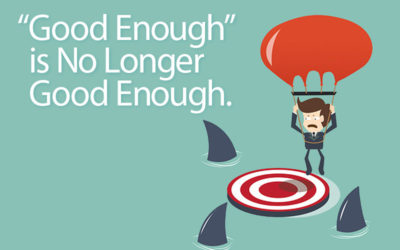A common mistake made by many businesses is thinking that their expertise will sell itself. All they have to do is talk about their qualifications and business will follow. While you may be truly great at what you do, it’s important that your audience comes first in your messaging.
Any time you reach out to prospects, you first need to identify with them. Assure them that you know who they are, what they face and how they define success. Empathy is a great tool. Show that you understand their challenges by talking about them. Until you get them to think, “Hey, they know me!” you’ll have difficulty not sounding self-serving.
Now that you’ve connected with them, then convey the benefits of what you offer and how it will help them overcome their challenges. Then, back it all up with third-party testimonials. Establishing your credibility is a task best done by others (customers, press coverage, colleagues, etc).
Last, but not least, it’s time to tout your experience, distinguish yourself from your competition and demonstrate why you’re worthy of your audience’s consideration. Your qualifications should be communicated concisely and selectively. But, don’t go overboard. While a little swagger shows confidence, arrogance sows the seeds of its own undoing. So, be sure to strike the right balance … and do so with a measure of humility.
Sure, “all about you” is important. And you may be one of the best there is. But, when you promote your business, you’ll be better served if you save the best (you) for last.
Related Posts
Get real.
Don’t claim to be what you’re not. Embrace what you are, what makes you great and why that should be important to your audience.
WHO are you selling to, anyway?
Price, style, features and convenience will always be important factors to closing a sale. However, there’s a lot more to promoting your business than what your goods or services mean to your direct consumers. In fact, your audience is likely much broader than you realize.
WHAT are you selling, anyway?
In order to be an effective marketer, it’s imperative that we continually remind ourselves of the true value we bring to our markets. Usually, that customer benefit is intangible. Quite often, we learn that it’s an emotional one.
“Good enough” Is no longer good enough.
Those who can harness the benefits of new technology without losing sight of the basics, like branding, creativity and targeted outreach, will be poised for greater success than those who find contentment with what they consider, “Good enough.”
A dash of humility makes a better pie.
Isolating yourself in a bubble of self-adulation might make you feel good. But, it doesn’t get you anywhere and, worse yet, it prevents you from uncovering opportunities to distinguish your business from the competition.
An act of aggression can be a good thing.
Emulating your competition projects a sense that you belong. But, ultimately, your offering will only succeed if you can effectively distinguish it from the other guys. And keep doing so.
Why we take Super Bowl ads with a grain of salt
Yes, watching the ads is great fun. Especially to us in the biz. And some of them do set new creative trends. But, what’s the real purpose? Is it to outdo the others? To get the industry awards? The most post-game buzz?
If I’ve told you once…
Consistency, frequency and, of course, clarity are each critical to having your value statement penetrate the marketplace and gain traction. And, without traction, you cannot build momentum.









